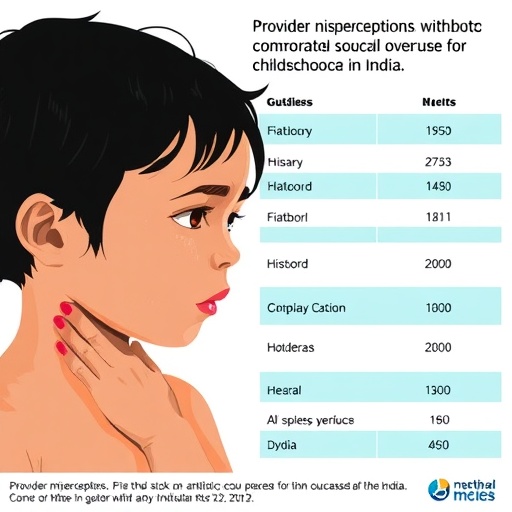In a groundbreaking investigation that challenges long-standing assumptions about antibiotic overprescription in pediatric diarrhea cases in India, researchers from the University of Southern California (USC) and Duke University have unveiled new insights into the behavioral dynamics influencing clinical practice. Their study, published in Science Advances on September 10, 2025, spotlights the critical distinction between what healthcare providers know and what they actually do—a phenomenon termed the “know-do gap.” This gap emerges as the predominant driver behind the rampant misuse of antibiotics in India’s vast private healthcare sector, overshadowing previously held beliefs that profit motives or supply shortages were primary culprits.
The study’s extensive fieldwork encompassed 2,282 private healthcare providers dispersed across 253 towns in India, a dataset notable for its breadth and representativeness. Through a series of meticulously designed standardized patient visits, the researchers documented that an alarming 70 percent of providers administered antibiotics in cases of pediatric diarrhea despite the absence of bacterial infection indicators. More strikingly, among providers fully aware that antibiotics were not clinically indicated, nearly two-thirds still prescribed them, underscoring a profound dissonance between knowledge and practice.
Quantitatively dissecting the issue, the researchers differentiated between the knowledge gap—providers’ ignorance about appropriate treatment—and the know-do gap—providers’ failure to translate knowledge into action. Their analysis illuminated that merely closing the knowledge gap would effectuate a modest 6 percentage point reduction in inappropriate antibiotic prescriptions. However, bridging the know-do gap promised a fivefold greater impact, potentially curbing misuse by approximately 30 percentage points. This delineation fundamentally reframes the discourse on interventions aimed at antibiotic stewardship.
To unravel the behavioral underpinnings steering this disconnect, the team employed randomized controlled experiments probing provider motivations and beliefs. Contrary to entrenched assumptions, neither financial incentives derived from antibiotic sales nor shortages of oral rehydration salts (ORS)—the WHO-recommended frontline treatment for pediatric diarrhea—significantly influenced prescribing patterns. Instead, providers’ perceptions of patient expectations emerged as the pivotal factor. When patients explicitly voiced a preference for ORS, inappropriate antibiotic prescribing dropped by 17 percentage points on average, a trend especially pronounced in pharmacy settings, which often operate at the interface between clinical guidance and accessibility.
Complementing provider-focused experiments, a discrete choice analysis involving 1,189 caregivers revealed a striking misalignment between provider beliefs and actual patient preferences. Contrary to providers’ assumptions, caregivers demonstrated no preference for providers who prescribed antibiotics over those who recommended ORS. This misperception highlights a critical communication failure at the patient-provider interface, where imagined demands inadvertently drive inappropriate clinical practices.
Zachary Wagner, the study’s corresponding author and an economist at USC’s Center for Economic and Social Research, emphasized the transformative potential of these findings. He noted, “Our data reveal a striking disconnect: clinicians know antibiotics are wrong for most diarrhea cases, yet prescribe them anyway because they think parents expect ‘strong’ medicines.” He further articulated that reshaping provider perceptions of patient preferences, rather than inundating clinicians with additional didactic training, represents a strategic leverage point for global antibiotic stewardship efforts.
Echoing this sentiment, coauthor Neeraj Sood of USC’s Schaeffer Center and Price School underscored the broader ramifications of unnecessary antibiotic use in children, particularly in fostering antimicrobial resistance—a global public health threat transcending national boundaries. “By showing that patient–provider communication trumps financial motives,” Sood stated, “we give policymakers a laser-focused lever: help doctors understand real patient preferences.” His insights call for a paradigm shift from financial or supply-side interventions toward nuanced social and behavioral strategies.
The study’s granular data further reveal that less formally trained providers and pharmacies—notably the health system’s frontline access points—exhibited the largest know-do gaps. These settings, often characterized by informal or semi-formal service delivery, are uniquely sensitive to caregiver preference signaling. Interventions empowering caregivers to articulate their treatment expectations, alongside public awareness campaigns dispelling myths of antibiotic demand, could thus unlock outsized reductions in misuse. Manoj Mohanan of Duke University highlighted this potential, stating, “Interventions that empower caregivers to voice a preference for ORS, or public campaigns signaling that parents don’t demand antibiotics, could slash misuse at scale.”
Importantly, the research suggests that conventional methods focusing on provider knowledge dissemination or financial incentives are unlikely to succeed in isolation. Providing ORS stock or altering point-of-sale profit structures did not meaningfully change prescribing behavior, revealing the imperative to engage more deeply with psychosocial and communication dimensions of healthcare delivery.
By conducting randomized experiments in real-world clinical settings, the study reinforces the utility of experimental economics methodologies in health systems research. This approach elucidates causal mechanisms driving behavior, offering a replicable model for tackling complex challenges in global health.
As antimicrobial resistance continues to mount as a global crisis, representing a looming threat to modern medicine and public health, these findings offer a compelling blueprint for intervention. They advocate for targeted, contextually sensitive strategies that recognize the intricacies of patient-provider dynamics and cultural norms within India’s healthcare ecosystem.
In sum, the research unveils a powerful truth: tackling antibiotic overuse necessitates more than merely imparting knowledge or adjusting financial incentives. It demands reimagining the relational fabric of clinical decision-making, placing caregiver preferences and communication at the forefront of stewardship initiatives. This revelation not only augurs well for India—one of the largest antibiotic consumers worldwide—but also offers transferable lessons for healthcare systems globally wrestling with similar challenges.
The study was funded by the National Institute of Diabetes and Digestive and Kidney Diseases (NIDDK) under grant number 5R01DK126049, exemplifying the crucial role of sustained investment in interdisciplinary research bridging economics, medicine, and behavioral science.
Subject of Research: Antibiotic overprescribing and behavioral drivers in pediatric diarrhea treatment
Article Title: Investigating the know-do gap in antibiotics prescribing: Experimental evidence from India
News Publication Date: 23 September 2025
Web References:
References:
Zachary Wagner, Manoj Mohanan, Arnab Mukherji, Rushil Zutshi, Sumeet Patil, Jagadish Krishnappa, Somalee Banerjee, Neeraj Sood. Investigating the know-do gap in antibiotics prescribing: Experimental evidence from India. Science Advances, 10 September 2025.
Keywords: Public health, Antibiotics, Know-do gap, Pediatric diarrhea, India, Antibiotic stewardship, Patient-provider communication, Behavioral economics




